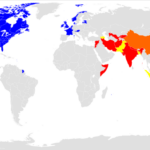The EU’s new AI Act will have significant implications for major technology companies
- The EU has finalized the world’s first comprehensive legal framework for artificial intelligence
- The AI Act aims to protect European citizens’ rights and bring stricter oversight to AI technology
- Big tech companies like Alphabet, Amazon, Microsoft, and Meta Platforms will be affected by the Act
- The potential penalties for violations involving banned AI applications are considerable
- The EU’s rules often become the international standard due to the Brussels Effect
- The AI Act passed the European Parliament with an overwhelming majority
- Foundation models generally only face transparency obligations under the Act
- High impact foundation models will have stricter requirements, including model evaluations and risk assessments
- Open-source models are exempt from some obligations, but not if they pose a systemic risk
- The EU’s AI framework differs from the US, as the US has not passed comprehensive legislation on AI
The European Union has finalized the world’s first comprehensive legal framework for artificial intelligence with the approval of the AI Act. This legislation aims to protect the rights of European citizens and bring stricter oversight to AI technology. Big tech companies like Alphabet, Amazon, Microsoft, and Meta Platforms will be affected by the Act, as it applies to anyone providing AI within the EU. The potential penalties for violations involving banned AI applications are considerable, including a percentage of a company’s global annual turnover. The EU’s rules often become the international standard, thanks to the Brussels Effect. The AI Act passed the European Parliament with an overwhelming majority, ensuring its approval by the EU’s member states. Under the Act, foundation models generally only face transparency obligations, while high impact foundation models will have stricter requirements such as model evaluations and risk assessments. Open-source models are exempt from some obligations, but not if they pose a systemic risk. In comparison, the US has not passed comprehensive legislation on AI. Instead, President Joe Biden has issued an executive order and some companies have made voluntary pledges on AI safety. The EU’s regulation gives authorities clearer legal power to act on perceived breaches of AI rules, but it may also limit the market for certain AI applications in Europe.
Factuality Level: 7
Factuality Justification: The article provides a detailed overview of the EU’s AI Act, including its implications for companies like OpenAI, Alphabet, Amazon, Microsoft, and Meta Platforms. It discusses the key decisions made during the negotiations and compares the EU framework with U.S. regulation. The information presented seems to be accurate and well-researched without significant bias or misleading details.
Noise Level: 3
Noise Justification: The article provides a detailed analysis of the EU’s AI Act and its implications on various companies. It discusses the key decisions made during the negotiations and compares the EU framework with U.S. regulations. The article stays on topic and provides relevant information supported by examples. However, it contains some repetitive information and could benefit from more in-depth analysis on the consequences of the AI Act on the market.
Financial Relevance: Yes
Financial Markets Impacted: The EU’s AI Act is likely to impact companies like Alphabet, Amazon.com, Microsoft, and Meta Platforms, as the EU’s rules apply to anyone providing AI within the bloc.
Presence Of Extreme Event: No
Nature Of Extreme Event: No
Impact Rating Of The Extreme Event: No
Rating Justification: The article discusses the approval of the EU’s AI Act, which will have implications for major technology companies. However, there is no mention of an extreme event or its impact.
Public Companies: Alphabet (GOOGL), Amazon.com (AMZN), Microsoft (MSFT), Meta Platforms (META)
Private Companies: OpenAI
Key People: Joe Biden (President), Mistral (AI company), Aleph Alpha (AI company)
Reported publicly:
 www.marketwatch.com
www.marketwatch.com 





